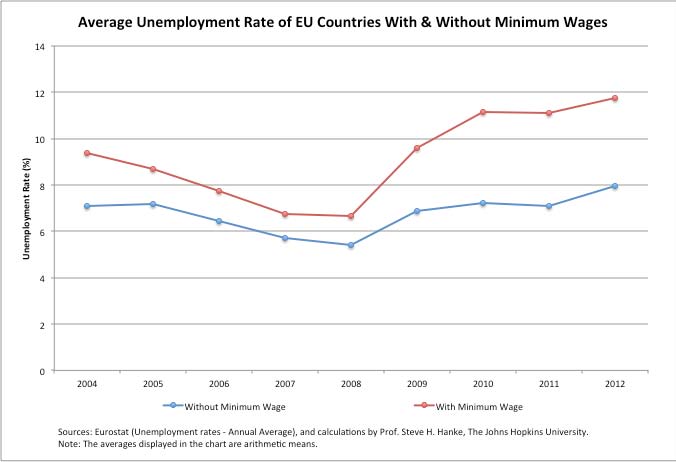Minimum Wage Laws Kill Jobs
Economics / Economic Theory Jan 30, 2014 - 02:15 PM GMTBy: Steve_H_Hanke
President Obama set the chattering classes abuzz after his unilateral announcement to raise the minimum wage. During his State of the Union address, he sang the praises for his action, saying that “It’s good for the economy; it’s good for America.”[1] Yet this conclusion doesn’t pass the economic smell test; just look at the data from Europe.

There are seven European Union (EU) countries with no minimum wage (Austria, Cyprus, Denmark, Finland, Germany, Italy, and Sweden). If we compare the levels of unemployment in these countries with EU countries that impose a minimum wage, the results are clear – a minimum wage leads to higher levels of unemployment. In the 21 countries with a minimum wage, the average country has an unemployment rate of 11.8%; whereas, the average unemployment rate in the seven nations without a minimum wage is about one third lower – at 7.9%.
Nobelist Milton Friedman said it best when he concluded that “The real tragedy of minimum wage laws is that they are supported by well-meaning groups who want to reduce poverty. But the people who are hurt most by high minimums are the most poverty stricken.”[2]
[1] Barack Obama, State of the Union Address, New York Times, January 28, 2014.
[2] Milton Friedman, The Minimum Wage Rate, Who Really Pays? An Interview With Milton Friedman and Yale Brozen, 26-27 (Free Society Association ed. 1966), quoted in Keith B. Leffler, “Minimum Wages, Welfare, and Wealth Transfers to the Poor,”Journal of Law and Economics 21, no. 2 (October 1978): 345–58.
By Steve H. Hanke
www.cato.org/people/hanke.html
Steve H. Hanke is a Professor of Applied Economics and Co-Director of the Institute for Applied Economics, Global Health, and the Study of Business Enterprise at The Johns Hopkins University in Baltimore. Prof. Hanke is also a Senior Fellow at the Cato Institute in Washington, D.C.; a Distinguished Professor at the Universitas Pelita Harapan in Jakarta, Indonesia; a Senior Advisor at the Renmin University of China’s International Monetary Research Institute in Beijing; a Special Counselor to the Center for Financial Stability in New York; a member of the National Bank of Kuwait’s International Advisory Board (chaired by Sir John Major); a member of the Financial Advisory Council of the United Arab Emirates; and a contributing editor at Globe Asia Magazine.
Copyright © 2014 Steve H. Hanke - All Rights Reserved
Disclaimer: The above is a matter of opinion provided for general information purposes only and is not intended as investment advice. Information and analysis above are derived from sources and utilising methods believed to be reliable, but we cannot accept responsibility for any losses you may incur as a result of this analysis. Individuals should consult with their personal financial advisors.
Steve H. Hanke Archive |
© 2005-2022 http://www.MarketOracle.co.uk - The Market Oracle is a FREE Daily Financial Markets Analysis & Forecasting online publication.



